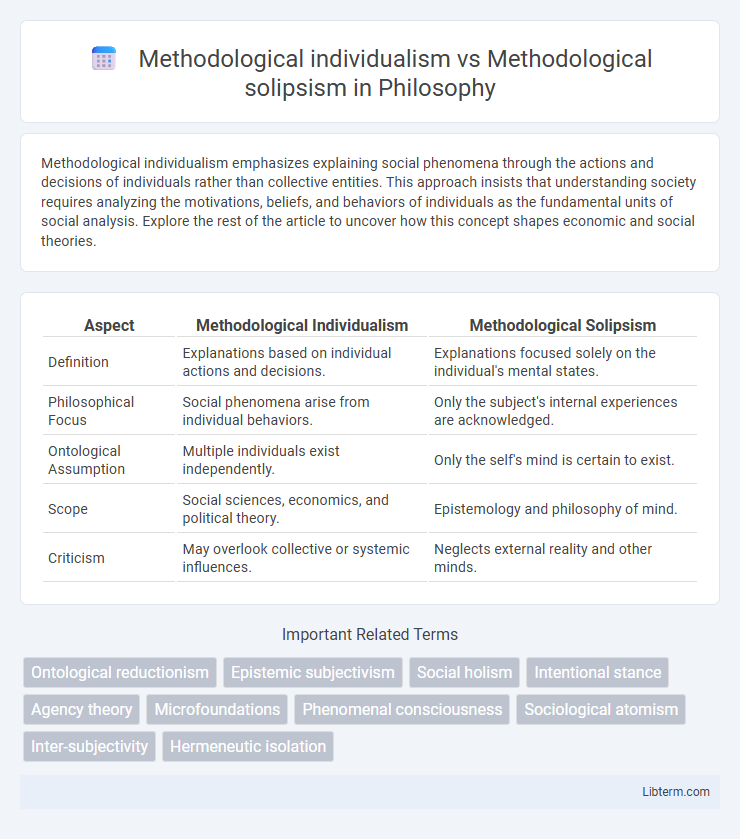Methodological individualism emphasizes explaining social phenomena through the actions and decisions of individuals rather than collective entities. This approach insists that understanding society requires analyzing the motivations, beliefs, and behaviors of individuals as the fundamental units of social analysis. Explore the rest of the article to uncover how this concept shapes economic and social theories.
Table of Comparison
| Aspect | Methodological Individualism | Methodological Solipsism |
|---|---|---|
| Definition | Explanations based on individual actions and decisions. | Explanations focused solely on the individual's mental states. |
| Philosophical Focus | Social phenomena arise from individual behaviors. | Only the subject's internal experiences are acknowledged. |
| Ontological Assumption | Multiple individuals exist independently. | Only the self's mind is certain to exist. |
| Scope | Social sciences, economics, and political theory. | Epistemology and philosophy of mind. |
| Criticism | May overlook collective or systemic influences. | Neglects external reality and other minds. |
Introduction to Methodological Individualism and Methodological Solipsism
Methodological individualism emphasizes explaining social phenomena through the actions and intentions of individuals, asserting that societal structures emerge from individual behaviors. Methodological solipsism, by contrast, limits analysis to the mental states and cognitive processes of individuals, disregarding external social realities or interactions. Both frameworks prioritize individuals but differ on whether external social factors are incorporated into explanatory models.
Defining Methodological Individualism
Methodological individualism defines social phenomena by analyzing actions, decisions, and motivations of individual agents rather than collective entities. It asserts that all social realities and structures result from individual interactions and choices, emphasizing autonomy and agency at the micro-level. This approach contrasts with methodological solipsism, which confines explanations strictly to mental states without considering external social contexts.
Defining Methodological Solipsism
Methodological solipsism defines individual behavior strictly based on internal mental states and beliefs, excluding any external social context or collective influences. This approach contrasts with methodological individualism, which accounts for individuals' actions as influenced by both internal reasoning and external social conditions. By isolating cognitive processes, methodological solipsism emphasizes subjective experiences as the sole determinants of decision-making and agency.
Philosophical Origins and Historical Context
Methodological individualism, rooted in 19th-century liberal philosophy and economics, emphasizes analyzing social phenomena by focusing on individual actions and choices, drawing from thinkers like Max Weber and Karl Menger. Methodological solipsism, emerging from 20th-century analytic philosophy and cognitive science, centers on the mental states of individuals as the sole basis for explanation, heavily influenced by philosophers like Wilfrid Sellars and U.T. Place. The historical context of both approaches reveals a tension between social ontology and epistemology, with individualism grounding social science in external behaviors, while solipsism prioritizes internal mental representations.
Core Differences Between the Two Approaches
Methodological individualism emphasizes understanding social phenomena through individuals' actions and decisions, treating society as the aggregate of individual behaviors. Methodological solipsism centers on analyzing individual mental states and cognitive processes, ignoring external social and environmental contexts. The core difference lies in methodological individualism's focus on social interactions among individuals, while solipsism restricts analysis to solitary cognitive mechanisms without considering external social realities.
Methodological Implications in the Social Sciences
Methodological individualism emphasizes analyzing social phenomena through individual actions and choices, enabling precise modeling of behavior and causal relationships in social sciences. Methodological solipsism restricts analysis to an individual's internal states, limiting the exploration of social interactions and external influences, which can hinder comprehensive understanding of social dynamics. The methodological implications highlight the necessity of balancing individual cognition with observable social contexts to achieve robust explanations in social research.
Critiques and Limitations of Methodological Individualism
Methodological individualism faces critiques for oversimplifying social phenomena by ignoring collective structures and institutional influences that shape individual behavior. Critics argue it underestimates the role of social norms, shared meanings, and emergent group properties, leading to incomplete explanations of social realities. This limitation constrains its analytical power in fields like sociology and economics, where interactions and systemic factors are crucial for understanding complex outcomes.
Critiques and Limitations of Methodological Solipsism
Methodological solipsism faces critiques for its reductionist approach that isolates individual mental states, overlooking the influence of social interactions and external contexts on behavior and cognition. Critics argue it neglects the relational and collective dimensions essential for understanding complex social phenomena, limiting its explanatory power in social sciences. This approach may lead to incomplete or skewed analyses by failing to incorporate intersubjective realities and environmental factors that shape individual actions.
Practical Applications and Case Studies
Methodological individualism centers on analyzing social phenomena by examining individual actions and decisions, proving effective in microeconomic modeling and behavioral economics where individual incentives drive outcomes. Methodological solipsism restricts analysis to an agent's internal mental states, making it useful for cognitive science and artificial intelligence research that prioritizes internal belief systems and decision-making processes. Case studies in organizational behavior highlight methodological individualism's capacity to explain collective outcomes through individual motivations, while experiments in epistemic modeling demonstrate methodological solipsism's strength in understanding knowledge acquisition and belief revision.
Conclusion: Comparative Insights and Future Directions
Methodological individualism emphasizes analyzing social phenomena by focusing on individual actions and decisions as fundamental units, whereas methodological solipsism centers on cognitive states and psychological processes of the individual, excluding social interactions. Comparative insights reveal that combining these approaches can enrich understanding by integrating external social contexts with internal cognitive mechanisms. Future research should explore hybrid frameworks that reconcile individual agency with social structures to advance comprehensive social theory.
Methodological individualism Infographic

 libterm.com
libterm.com